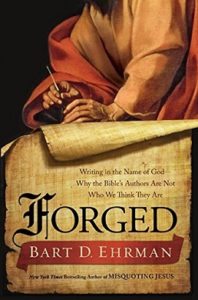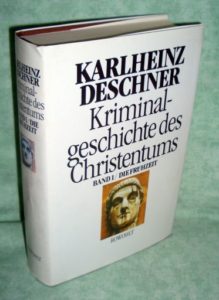I had said that the revised edition of the first volume of our abridged translation of Karlheinz Deschner’s criminal history of Christianity would cover the origins of Judeo-Christianity up to Charlemagne.
Now that I have just finished proofreading up to the time of Emperor Justinian of Constantinople, I realised that it is better to finish the first volume up to that monarch and leave the rest of the High Middle Ages (roughly from the 6th to the 10th century) for the second volume.
As I am thinking in editorial terms for my Daybreak Press, I think the cover of the first volume should have the face of Constantine; and the second volume, the face of Charlemagne.
So the revised edition of the first volume will soon be ready and its PDF will be available on this site, and we will continue working on what we still have to translate for volume II.
To give the visitor an idea of what we have translated so far for this site, here is the table of contents:
CONTENTS
Editor’s foreword
Introduction
Forgeries in the Old Testament
The bibles
The five books that Moses did not write
David and Solomon
Joshua and Isaiah
Ezekiel and Daniel
The Jewish apocalyptic
Portrayals of the biblical female world
Opposition to the Old Testament
Forgeries in diaspora Judaism
Forgeries in the New Testament
The scriptures are piled up
God as the author?
Christians forged more consciously than Jews
Neither the Gospel of Matthew, nor the Gospel of John,
nor John’s Book of Revelation come from the apostles to
whom the Church attributes them
Forged epistles of ‘Paul’
The second epistle to the Thessalonians
Colossians, Ephesians and Hebrews
Forged epistles of Peter
Forged John and James
Interpolations in the New Testament
The invention of Popes
There is no evidence of Peter’s stay in Rome
The story of the discovery of Peter’s tomb
The list of fabricated Roman bishops
Christianity’s Criminal History:
Background in the Old Testament
Moses and the Book of Judges
The ravages of David and the modern translators
The sacred warmongering of the Maccabees
The Jewish War (66-70)
Bar Kokhba and the ‘last war of God’ (131-136)
The Jewish religion, tolerated by the Roman state
Early Christianity
Interpretatio Christiana
‘Orthodoxy’ and ‘heresy’
First ‘heretics’ in the New Testament
Thirteen good Christians
Saint Jerome and Origen
The persecution of the Christians
Anti-Hellene hatred in the New Testament
The defamation of the Greco-Roman religion
Celsus and Porphyry
The persecution of the Christians
Most of the written statements about the martyrs are false,
but all of them were considered as valid documents
The Roman emperors viewed retrospectively
Saint Constantine: The First Christian Emperor
War against Maxentius
War against Maximinus
War against Licinius
The Catholic clergy increasingly favoured
Constantine as saviour and vicar of God
No longer a pacifist Church
Savage criminal practices
Constantine against Jews and ‘heretics’
Constantine against the Greco-Roman culture
Constantine’s successors
The first Christian dynasty founded
on family extermination
First wars among devout Christians
Constantius and his Christian-style government
A father of the Church who preaches killing
First assaults on the temples
Julian
Hecatombs under the pious Gallus
Emperor Julian
Christian tall stories
After Julian
Rivers of blood under the Catholic Valentinian
Trembling and gnashing of teeth under the Arian Valens
Athanasius, Doctor of the Church
The complicated nature of God
It was not fought for faith but for power
The Council of Nicaea
Character and tactics of a Father of the Church
The death of Arius
The battlefield of Alexandria
Antioch and Constantinople
Shelter with a twenty-year-old beauty
Ambrose, doctor of the Church
Ambrose drives the annihilation of the Goths
Emperor Theodosius ‘the Great’
Against the Hellenist religion
The Father of the Church Augustine
‘Genius in all fields of Christian doctrine’
Augustine’s campaign against the Donatists
The overthrow of Pelagius
Augustine attacks classical culture
Augustine sanctions the holy war
Christianity sanctions the mistreatment of animals
The Christian Book Burning and the
Annihilation of Classical Culture
The annihilation of the Greco-Roman world
The oldest Christianity is hostile to education
The Christian ideal: the inversion of values
The hostility to culture of the first Greco-Christian writers
The hostility to classics in early Latin-Christian writers
The theatre, ‘The temple of the devil’
Natural Science
Everything a person needs to know is contained in the Bible
The Western world darkens more and more
The Catholic ‘children emperors’
The division of the Empire: Two Catholic states emerge
The massacre of Goths in Constantinople
Alaric enters Rome
Justinian (527-565): A theologian on the imperial
throne
Justin: From pigman to Catholic emperor (518-527)
Emperor Justinian, dominator of the Church
The Vandal state
The great beneficiary of all that hell: The Roman Church
The Middle Ages
A panoramic view
From convinced subjects to convinced lords
The Christianisation of the Germans
The spread of Christianity in the West
Conversion methods
Jesus becomes the Germanic broadsword
The weed of the past
‘Demonstrative destruction’
Clovis, founder of the Great Frankish Empire
The Rise of the Merovingians
A great bloodbath and the German Church
A moralistic assessment of history?
The sons of Clovis
The division of the kingdom
A saint and murderer
Theudebert I and kings killer
The Invasion of the Lombards
The last Merovingians
The Conversion of the Visigoths to Catholicism
Pope Gregory I (590-604)
The flight from the world
The man of double standards
Thinking differently: a crime worthy of death
Use and abuse of slaves as livestock
The beginning of papal propaganda in England
Pope Gregory’s books
The Christianisation of the idea of king
The Christianisation of the idea of kingship
Mission and slaughter
The Church in the Merovingian Period
A kind of holy cancerous ulcer
Ignorant, criminal and a good Catholic
St Gregory of Tours
The throne and the altar
The Ascension of the Carolingians
Armed mission among the Frisians
The irruption of Islam
St Boniface, ‘Apostle of the Germans’ and of Rome
Deliverance from ‘all uncleanness’
The dispute over images begins
The papal revolution fails
Charles I, known as The Great or Charlemagne
Papal negotiations
The most momentous event of the Middle Ages
Criminal excesses at the papal court
The beginning of the pro-pope warfare
The bloody mission of the Saxons (772-804)
Plunder and Christianisation
The Christian banners enter Saxony
A mission along military shock lines
The butcher of the Saxons
Last uprisings, war of annihilation
Charlemagne’s bloody laws
Karolus serenissimus augustus
Appendix: Constantine controversy
‘Response given’ by Hermann Gieselbusch
Deschner responds to Maria R.-Alföldi
______ 卐 ______
 Regarding the way I rearranged Deschner’s books, as can be seen in the index above, he published his Vol. 3, Die Alte Kirche (full title: The Ancient Church: forgery, brain-washing, exploitation, annihilation) in 1990, from which I took the passages of the first couple of chapters of our abridged Vol I. Twenty years later, biblical scholar Bart D. Ehrman published Forged: Writing in the Name of God: Why the Bible’s Authors Are Not Who We Think They Are, pictured left.
Regarding the way I rearranged Deschner’s books, as can be seen in the index above, he published his Vol. 3, Die Alte Kirche (full title: The Ancient Church: forgery, brain-washing, exploitation, annihilation) in 1990, from which I took the passages of the first couple of chapters of our abridged Vol I. Twenty years later, biblical scholar Bart D. Ehrman published Forged: Writing in the Name of God: Why the Bible’s Authors Are Not Who We Think They Are, pictured left.

4 replies on “I’ve changed my mind”
Hello Caesar, I have some doubts within my mind and I thought on sharing them with the rest of the folk here.
I understand that this a spiritual/moral/cultural war that we are against the Jew. They are winning because they still have a solid grip on majority of white men’s spirit and vices.
We will win once this grip is broken. We can break it by understanding that Judeo Christianity is a troyan horse of spiritual subversion. Same concept for atheistic liberalism.
They can understand this once they have gone through the darkest hour of their souls, which means once their lives have become much less comfortable.
Is there something I am missing? Or maybe another alternative for them to reach understanding?
Regards
Small correction – you meant the Dark Ages, not the High Middle Ages. (Incidentally, the very term the Dark Ages is now controversial, probably because it’s a value judgement against Christianity.)
Speaking about the dark ages…
If going through your darkest hour is the key to break free from jewish spiritual grip, and we consider the renaissance as the rediscovery of pagan virtues:
How did Judeo Christianity survive after the dark ages?
Read Pierce’s Who We Are.